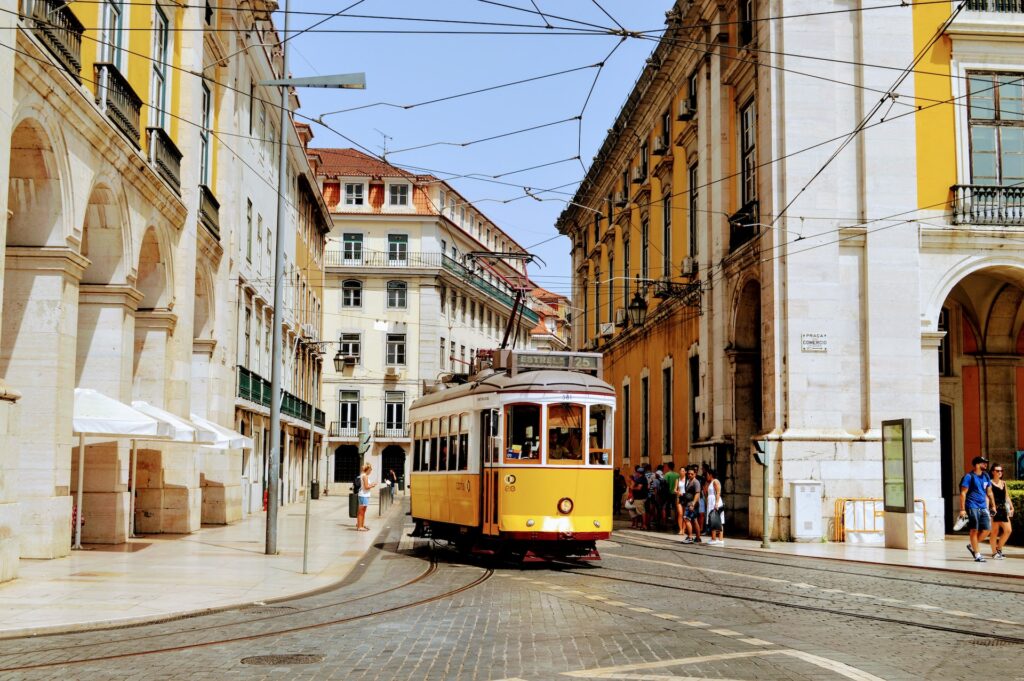In an era defined by environmental consciousness and a collective commitment to preserving our planet, Portugal emerges as a beacon of sustainable living.
This picturesque nation, nestled on the southwestern edge of Europe, has garnered international attention for its dedication to reducing carbon emissions, combating food waste, and championing locally-sourced products.
For those contemplating a move to Portugal, the promise of a sustainable, eco-friendly lifestyle has never been more appealing.
Is Portugal a sustainable country?
Portugal unquestionably stands out as a shining example of sustainability on the global stage. First and foremost, Portugal’s ranks at 18th position in the Sustainable Development Report of 2023 speaks volumes about its dedication to sustainable practices.
Moreover, Portugal’s energy landscape paints a picture of sustainable progress. With over 50 percent of its electricity production sourced from renewable energies, including solar and wind power, the country has made remarkable strides in reducing its carbon footprint.
Perhaps the most ambitious demonstration of Portugal’s commitment to sustainability is its goal to achieve net-zero emissions ahead of schedule, targeting the year 2045.
This proactive stance against climate change sets a powerful example for the global community, solidifying Portugal’s position as a leader in sustainable practices.

Tips for a sustainable living in Portugal
Living sustainably in Portugal is not just a choice; it’s a way of life, and here are some valuable tips to help you embracing the beauty of this eco-conscious nation:
- Reduce, Reuse, Recycle
- Conscious Water Usage
- Choose a Green Energy Provider
- Use Public Transportation
- Reduce Meat Consumption
- Support Local Producers
- Reusable Shopping Bags
- Produce your own renewable energy
- Sustainable Tourism
- Volunteer and Get Involved
1. Reduce, Reuse, Recycle
Portugal, like many other environmentally conscious nations, places a strong emphasis on reducing waste and promoting responsible consumption. To embrace this ethos, it’s crucial to reduce your overall consumption, especially of single-use items.
Opt for reusable bags, containers, and utensils to minimize plastic waste. Support businesses that prioritize eco-friendly packaging and products.Additionally, recycling is widely practiced in Portugal, with accessible recycling bins in most communities.
Familiarize yourself with local recycling guidelines to ensure proper disposal. Reducing waste at home, such as composting organic materials, can further contribute to a sustainable lifestyle.

2. Conscious Water Usage
Portugal’s Mediterranean climate, characterized by hot and dry summers, makes water conservation a top priority. To live sustainably in Portugal, it’s essential to be mindful of water usage. Here are some tips:
- Install water-saving fixtures in your home, such as low-flow faucets and showerheads.
- Collect rainwater for outdoor use, like watering plants and gardens.
- Fix leaks promptly to prevent water wastage.
- Time your showers and avoid letting the tap run unnecessarily.
- Consider xeriscaping or planting drought-resistant native plants in your garden to reduce the need for irrigation.

3. Choose a Green Energy Provider
Portugal has made significant strides in transitioning to renewable energy sources, particularly wind and solar power. As an environmentally conscious resident, you have the opportunity to support these efforts by choosing a green energy provider for your home.
Green energy providers offer electricity generated from renewable sources, minimizing your reliance on fossil fuels and reducing greenhouse gas emissions. This not only supports Portugal’s commitment to a cleaner energy grid but also aligns with your sustainable living goals.
Before selecting a utilities provider, research the available options and compare their renewable energy offerings, pricing, and customer reviews. Here are some green energy providers, Gold Energy, Iberdrola or Yes Energy

4. Use Public Transportation
Portugal’s public transportation system is well-developed and efficient, making it an eco-friendly alternative to private car ownership. Choosing to use buses, trams, trains, and subways not only reduces traffic congestion but also lowers carbon emissions and conserves energy.
Major cities like Lisbon, Porto, and Faro have extensive public transportation networks, making it convenient to commute and explore without a car. Many cities also offer integrated ticketing options, making it easier and more cost-effective to switch between different modes of public transport.
Additionally, Portugal is investing in sustainable transportation initiatives, such as electric buses and cycling infrastructure, to further promote eco-friendly mobility options. Few options for swapping four wheels for two: Gira or Uber.

5. Reduce Meat Consumption
Portugal, known for its flavorful meat-based dishes, is also embracing the global shift towards more sustainable diets. Reducing meat consumption is a significant aspect of this transition, offering several key benefits.
It aids in mitigating environmental impacts by curbing the emissions and resource-intensive nature of the livestock industry. Furthermore, adopting a diet that emphasizes plant-based alternatives not only contributes to personal well-being by reducing the risk of chronic illnesses but also addresses ethical concerns related to animal welfare.
This sustainable practice aligns with Portugal’s commitment to environmental stewardship and healthier living.

6. Support Local Producers
Portugal’s local markets and small shops are vibrant hubs showcasing products sourced from small, local producers. These markets typically open on Saturday mornings, offering an excellent opportunity to wake up early, bring the family for a leisurely stroll, and explore a diverse range of offerings.
Here, you can find fresh, seasonal fruits, artisanal cheeses, handcrafted goods, and much more. Shopping at these venues not only supports local businesses but also reduces your carbon footprint by choosing products with shorter supply chains.
Portugal’s extensive coastline ensures a steady supply of fresh seafood. Local fish markets are open every day, making it easy to access fish directly from the sea, a more sustainable option compared to tank-farmed fish.

7. Reusable Shopping Bags
Embracing reusable shopping bags is a crucial element of sustainable living in Portugal. This practice not only reduces plastic waste but also aligns with the country’s efforts to promote eco-conscious consumer choices.
In Portugal, many supermarkets have taken proactive steps to encourage the use of reusable bags. One notable approach is charging customers for plastic bags, incentivizing them to bring their own reusable alternatives.
This policy not only reduces plastic bag usage but also raises awareness about the environmental impact of single-use plastics.

8. Produce your own renewable energy
In Portugal, the opportunity to produce your own renewable energy has never been more appealing. With an astonishing 300 days of sun per year, the country provides an ideal environment for harnessing solar power through photovoltaic panels.
Moreover, the Portuguese government has introduced a range of incentives and initiatives to encourage the installation of photovoltaic panels. These incentives, combined with a significant decrease in the cost of solar technology, have made renewable energy more accessible to homeowners.
Whether you choose to install solar panels on your roof, in your backyard, or within your garden, you can capitalize on Portugal’s abundant sunshine to generate clean, sustainable energy for your home.

9. Sustainable Tourism
Portugal’s magnificent natural landscapes and extensive coastline offer a prime setting for sustainable tourism. Water sports enthusiasts can indulge in activities such as surfing or paddleboarding while respecting the environment. Sustainable tourism in Portugal encourages travelers to engage in these activities responsibly, emphasizing ethical wildlife encounters and conservation efforts.
Portugal is home to several eco-resorts and environmentally conscious accommodations. These establishments prioritize minimizing their ecological footprint, employing sustainable practices such as energy efficiency and waste reduction.

10. Volunteer and Get Involved
Getting actively involved in various community and environmental initiatives is a powerful way to contribute positively to our world.
Whether it’s participating in local clean-up events, supporting conservation projects, or engaging in community programs, your actions can make a significant difference in fostering a more sustainable and vibrant future for all. both your community and the planet as a whole.
Are you interested? You can check Volunteer World or International Volunteer HQ.

Frequently Asked Questions About Sustainable Living in Portugal
Is the quality of life good in Portugal?
Absolutely, with its superb climate, exceptional quality of life, and ranking as the fourth safest country globally, Portugal stands out as an excellent choice for living.
What are the pros and cons of living in Portugal?
The affordability of living, delightful climate, and cultural richness stand among the numerous benefits that entice expatriates and foreigners. Yet, it’s equally essential to carefully consider potential downsides, such as language barriers, bureaucratic complexities, and the employment market.
What is the greenest city in Portugal?
Lisbon earned the prestigious title of European Green Capital for 2020 in recognition of its dedication to environmental initiatives.
Why is Portugal so green?
Portugal has elevated its renewable energy ambitions, potentially enabling the country to achieve net-zero emissions ahead of schedule, by 2045. Portugal is making substantial progress in specific renewable energy sectors, with solar and wind sources already accounting for more than 50 percent of the country’s electricity production.
Are there incentives for using renewable energy in Portugal?
Yes, the Portuguese government offers incentives for installing solar panels, energy-efficient appliances, and other renewable energy solutions. Tax benefits and subsidies are available for individuals and businesses adopting sustainable practices.
How popular is recycling in Portugal?
Recycling is actively promoted in Portugal, with separate bins for plastic, paper, glass, and organic waste widely available. Municipalities also run educational campaigns to encourage recycling and reduce waste.
Is Portugal bike-friendly?
Yes, many cities in Portugal, including Lisbon and Porto, are becoming increasingly bike-friendly, with new bike lanes and rental services like Gira and Bolt. Additionally, eco-friendly tourism options, like bike tours in scenic areas, are gaining popularity.
Can I live off the grid in Portugal?
Living off the grid is possible in rural parts of Portugal. Many people adopt solar or wind power, grow their own food, and use rainwater harvesting systems to create sustainable lifestyles, especially in areas like Alentejo and the Algarve.
What sustainable food options are available in Portugal?
Portugal has a growing number of organic markets, vegetarian/vegan restaurants, and stores offering locally-sourced produce. Community-supported agriculture (CSA) programs and farm-to-table initiatives are also gaining traction in cities and rural areas.




